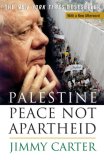Summary | Excerpt | Reviews | Beyond the Book | Readalikes | Genres & Themes | Author Bio

Critics' Opinion:
Readers' Opinion:
First Published:
Nov 2006, 264 pages
Paperback:
Sep 2007, 288 pages
 Book Reviewed by:
Book Reviewed by:
BookBrowse Review Team
Buy This Book
17
SUMMARY
Since the Israeli-Egyptian peace treaty was signed in 1979, much blood has been shed unnecessarily and repeated efforts for a negotiated peace between Israel and her neighbors have failed. Despite its criticism from some Arab sources, this treaty stands as proof that diplomacy can bring lasting peace between ancient adversaries. Although disparities among them are often emphasized, the 1974 Israeli-Syrian withdrawal agreement, the 1978 Camp David Accords, the Reagan statement of 1982, the 1993 Oslo Agreement, the treaty between Israel and Jordan in 1994, the Arab peace proposal of 2002, the 2003 Geneva Initiative, and the International Quartet's Roadmap all contain key common elements that can be consolidated if pursued in good faith.
There are two interrelated obstacles to permanent peace in the Middle East:
In turn, Israel responds with retribution and oppression, and militant Palestinians refuse to recognize the legitimacy of Israel and vow to destroy the nation. The cycle of distrust and violence is sustained, and efforts for peace are frustrated. Casualties have been high as the occupying forces impose ever tighter controls. From September 2000 until March 2006, 3,982 Palestinians and 1,084 Israelis were killed in the second intifada, and these numbers include many children: 708 Palestinians and 123 Israelis. As indicated earlier, there was an ever-rising toll of dead and wounded from the latest outbreak of violence in Gaza and Lebanon.
The only rational response to this continuing tragedy is to revitalize the peace process through negotiations between Israelis and Palestinians, but the United States has, in effect, abandoned this effort. It may be that one of the periodic escalations in violence will lead to strong influence being exerted from the International Quartet to implement its Roadmap for Peace. These are the key requirements:
a. The security of Israel must be guaranteed. The Arabs must acknowledge openly and specifically that Israel is a reality and has a right to exist in peace, behind secure and recognized borders, and with a firm Arab pledge to terminate any further acts of violence against the legally constituted nation of Israel.
b. The internal debate within Israel must be resolved in order to define Israel's permanent legal boundary. The unwavering official policy of the United States since Israel became a state has been that its borders must coincide with those prevailing from 1949 until 1967 (unless modified by mutually agreeable land swaps), specified in the unanimously adopted U.N. Resolution 242, which mandates Israel's withdrawal from occupied territories. This obligation was reconfirmed by Israel's leaders in agreements negotiated in 1978 at Camp David and in 1993 at Oslo, for which they received the Nobel Peace Prize, and both of these commitments were officially ratified by the Israeli government. Also, as a member of the International Quartet that includes Russia, the United Nations, and the European Union, America supports the Roadmap for Peace, which espouses exactly the same requirements. Palestinian leaders unequivocally accepted this proposal, but Israel has officially rejected its key provisions with unacceptable caveats and prerequisites.
Despite these recent developments, it is encouraging that Israel has made previous commitments to peace as confirmed by the Camp David Accords, the withdrawal of its forces from the Sinai, the more recent movement of settlers from Gaza, and its official endorsement of pertinent U.N. resolutions establishing its legal borders. After the Six-Day War in 1967, Israeli military forces occupied all of the territory indicated on Map 4, but joined the United States and other nations in supporting United Nations Resolution 242, which is still the binding law that condemns the acquisition of land by force and requires Israeli withdrawal from occupied territories.
Copyright © 2006 by Jimmy Carter. Reproduced with permission of the publisher, Simon & Schuster. All rights reserved.





The Funeral Cryer by Wenyan Lu
Debut novelist Wenyan Lu brings us this witty yet profound story about one woman's midlife reawakening in contemporary rural China.
Your guide toexceptional books
BookBrowse seeks out and recommends the best in contemporary fiction and nonfiction—books that not only engage and entertain but also deepen our understanding of ourselves and the world around us.